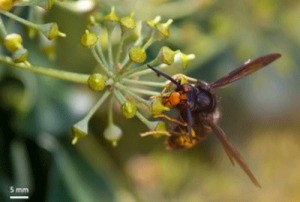[ad_1]
UF/IFAS advises of honey killer headed southern
The identifying of a brand-new predacious hornet in Georgia might indicate difficulty for Florida’s endangered honey if it spreads out better South.
To track the spread of the yellow-legged hornet, medically called Vespa velutina, UF/IFAS honey professionals are collaborating with the Florida Division of Farming and also Customer Solutions to get the word out on what locals can do if they see or capture among these hornets.

Karine Monceau, from Monceau et al. 2014 A yellow-legged hornet, a killer to the honey , rests on a plant.
“Honey in The United States and Canada have no all-natural defenses versus the yellow-legged hornet, so maintaining this types from making a residence in Florida is of miraculous value to our honey populaces and also therefore our food supply,” claimed Amy Vu, state specialized program county agent for the College of Florida/IFAS Honey Research Study and also Expansion Research Laboratory.
The Vespa velutina is an intrusive hornet that exploits honey and also honey larva. The initial USA discovery of the killer, which has actually currently harmed Europe’s populaces, was recently in Savannah, Georgia, by the Georgia Division of Farming after a yard beekeeper detected, caught and also reported 2 hornets.
The yellow-legged hornet is smaller sized, yet comparable to the Vespa mandarinia, recognized by its label the “murder hornet,” which has a distinctive orange mark on its head.
The yellow-legged hornet is best determined by its yellowish-white-colored legs, has to do with 1.2 centimeters to 3 centimeters long, and also has a wide orange-yellow confront with huge, famous eyes. The thorax and also abdominal area are mainly black with a solitary yellow area near completion of the abdominal area, according to UF/IFAS informative records.
The yellow-legged hornet is frequently incorrect with the generally seen European hornet, Vespa crabro, which is not a significant hazard to . The European hornet does not have yellow/white legs. European hornet examples need to not be sent, ideally.
To report a thought yellow-legged hornet e-mail dpihelpline@fdacs.gov or call the FDACS hotline at 1-888-397-1517.
We are below to share existing happenings in the sector. Society gathers and also shares write-ups released by outdoors resources. For more details concerning this certain short article, please see the initial release resource: https://www.mainstreetdailynews.com/local-living/outdoors/uf-ifas-warns-bee-predator-georgia
[ad_2]

